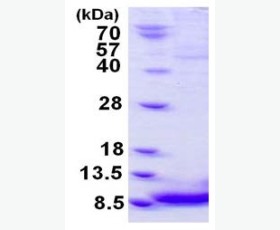Recombinant Human Regenerating Islet-Derived Protein 4/RELP
| Product name: | Recombinant Human Regenerating Islet-Derived Protein 4/RELP |
| Source: | Human Cells |
| Purity: | Greater than 95% as determined by reducing SDS-PAGE. |
| Buffer Formulation: | Lyophilized from a 0.2 μm filtered solution of 20mM PB,150mM NaCl, pH 7.2. |
| Applications: | Applications:SDS-PAGE; WB; ELISA; IP. |
| Storage: | Avoid repeated freeze/thaw cycles. Store at 2-8 oC for one month. Aliquot and store at -80 oC for 12 months. |
| UOM: | 100ug/50ug/200ug/1mg/1g |
| Source | Human Cells |
| Description | Recombinant Human Regenerating islet-derived protein 4 is produced by our Mammalian expression system and the target gene encoding Asp23-Pro158 is expressed with a 6His tag at the C-terminus. |
| Names | Regenerating islet-derived protein 4, Gastrointestinal secretory protein, REG-like protein, Regenerating islet-derived protein IV, GISP, RELP, REG4 |
| Accession # | Q9BYZ8 |
| Formulation | Lyophilized from a 0.2 μm filtered solution of 20mM PB,150mM NaCl, pH 7.2. |
| Shipping |
The product is shipped at ambient temperature. |
| Reconstitution |
Always centrifuge tubes before opening. Do not mix by vortex or pipetting. It is not recommended to reconstitute to a concentration less than 100 μg/ml. Dissolve the lyophilized protein in ddH2O. Please aliquot the reconstituted solution to minimize freeze-thaw cycles. |
| Storage |
Lyophilized protein should be stored at < -20°C, though stable at room temperature for 3 weeks. Reconstituted protein solution can be stored at 4-7°C for 2-7 days. Aliquots of reconstituted samples are stable at < -20°C for 3 months. |
| Purity |
Greater than 95% as determined by reducing SDS-PAGE. |
| Endotoxin | Less than 0.1 ng/µg (1 IEU/µg) as determined by LAL test. |
| Amino Acid Sequence |
DIIMRPSCAPGWFYHKSNCYGYFRKLRNWSDAELECQSYGNGAHLASILSLKEASTIAEYISGYQ RSQPIWIGLHDPQKRQQWQWIDGAMYLYRSWSGKSMGGNKHCAEMSSNNNFLTWSSNECNKRQHF LCKYRPVDHHHHHH
|
| Background | REG4 is a secreted contains one C-type lectin domain, high expressed in the gastrointestinal tract, including jejunum, ileum, appendix, pancreas and small intestine. REG4 can be up-regulated by mucosal injury from active Crohn’s disease or ulcerative colitis. In the acid environment, REG4 can maintain carbohydrate recognition activity. REG4 may be involved in inflammatory and metaplastic response of the gastrointestinal epithelium. |














